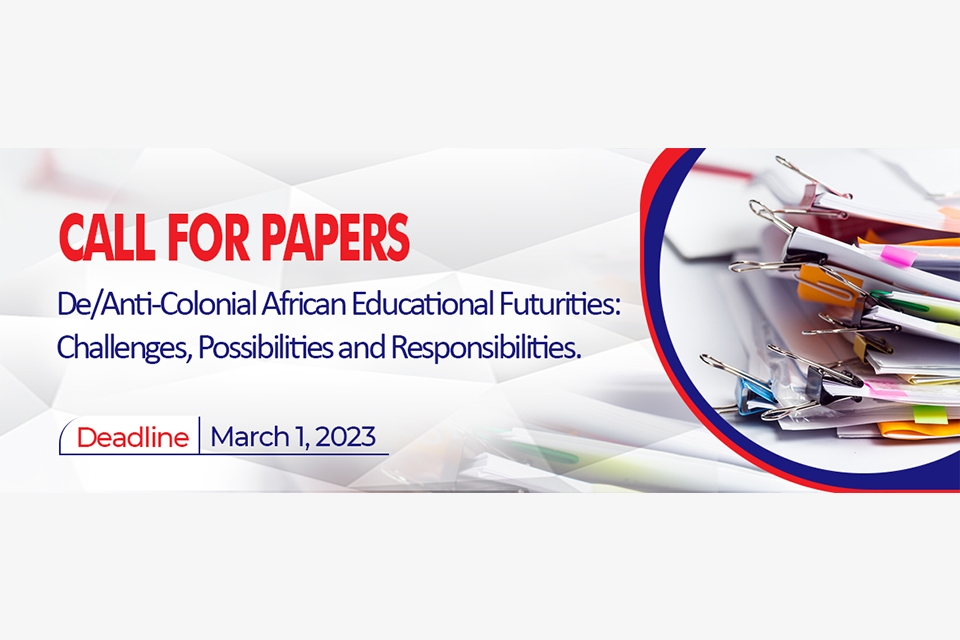Call For Papers | De/Anti-Colonial African Educational Futurities: Challenges, Possibilities and Responsibilities’

The Centre for School and Community Science and Technology Studies (SACOST) and the Institute for Educational Research and Innovation Studies (IERIS) UEW, in collaboration with the Centre for Integrative Anti-Racism Studies (CIARS), University of Toronto, are inviting scholars, researchers and interested individuals to contribute chapters to a book detailed as follows:
Book Title: De/Anti-Colonial African Educational Futurities: Challenges, Possibilities and Responsibilities
Co-Editors
George J. Sefa Dei, Director, Centre for Integrative Anti-Racism Studies & Professor of Social Justice Education Ontario Institute for Studies in Education of the University of Toronto [OISE/UT].
Wambui Karanja, PhD candidate, Social Justice Education Ontario Institute for Studies in Education of the University of Toronto [OISE/UT].
Ephraim Avea Nsoh, Professor & Director, The Institute for Educational Research and Innovation Studies (IERIS) of the University of Education, Ghana [UEW].
Daniel Yelkpieri, Head, Centre for School and Community Science and Technology Education [SACOST], The Institute for Educational Research and Innovation Studies (IERIS) of the University of Education, Ghana [UEW].
Anticipated Publisher
PeterLang Publishing, NewYork, USA
Anticipated Publication Date
Winter, 2024.
Submission Notes And Guidelines
Submission of Abstracts should be 150 words or less and should include keywords, to be sent to either:
wambui.karanja@mail.utorontoca
OR
In your submission, state the topic and or theme of your paper. Include your name and contact information.
Deadline for submission of abstracts: March 1, 2023
Date for Notification of acceptance of abstract: April 15, 2023.
The deadline for submission of full papers in WORD format is July 15, 2023.
Synopsis Of the Call For Papers
This collection will address the challenges, possibilities, and responsibilities for de/anti-colonial African educational futurities. The search for new educational futures for Africa has become pressing more so than ever before. This is in part due to emerging global educational challenges that demand that education responds to the needs of local specificities and global conditionalities simultaneously. There is an urgent need for a genuinely African-centred education that utilizes context-based knowledge and cultural resource material for local contexts to think through educational futurities for Africa. The collection of essays envisaged is from scholars and educational practitioners who share their research ideas and findings of the theory and practice of anti-colonial education in African and African Diasporic contexts. The focus is on anti-colonizing African education (broadly defined) using the curriculum, pedagogy, and classroom instruction as significant entry points. Among the questions posed are: How do we conceptualize decolonization in the context of African education? How do we link questions of Indigeneity, curriculum, pedagogy, and instructional development? How can African scholars on the continent and counterparts in the Diaspora work together to bring professional and intellectual skills for pedagogic, instructional, and curricular initiatives towards de/anti-colonial African education? What does it entail to address these educational challenges in contemporary times? How do we address questions of identity, setting target goals, incentivizing and promoting effective strategies for educational success through decolonized education? How do African and Black Diasporan scholars articulate ‘relevance’ and ‘debt to the community’? The book is particularly framed within an anti-colonial interrogation of collective educational leadership, responsibility, and accountability to address the invisibilization and marginalization of African Indigenous knowledge systems and to examine the critical role this knowledge can play in the decolonization of African education. We acknowledge there are many paths to decolonization (Smith, 2012), and it is particularly important for educators to begin by grounding our de/anti-colonial projects in Black & Indigenous ontologies and epistemes (see also Dei and Cacciavillani 2022). To reframe a decolonial education is to ask questions about omissions, negations, and absences in the school curriculum and classroom pedagogues, and how we provide critical comprehensive knowledge that accounts for the diversity of human experiences, histories, and ways of knowing. Decolonization, as many have noted begins by asking new questions grounded in non-Western epistemes and Indigenous philosophies (see Dei, 2023, Parry 1994). It should be a “subversive educational approach, not a superficial add-on, and requires actions to dismantle and rebuild” (see also Mihesuah, Mihesuah, & Waziyatawin, 2004; Hewitt, 2016). Decolonization is not about mainstreaming practice. In other words, a truly decolonial project cannot seek legitimation and validation from the dominant!). Our decolonial educational practices must be open and clear for all learners to see what educational agenda is being pursued. Long ago, Linda Smith (2012) asked us to acknowledge “the reach of imperialism into our heads” (Smith, 2012, cf. Jackson, 2019; p.109). What this also means is to recognize the ‘metaphoricity of decolonization’ as also about developing the ‘oppressor consciousness’ and awareness of “cultural invasion” (Freire, 2000). This is what Ngugi wa Thiong’o referred to when he long posited that we must be aware of the severity of the problem of colonization, particularly as it has to do with the colonization of ‘the mental universe’ of the colonized worlds (wa Thiong’o, 1981; p.16). We have deliberately left out a choice of possible topics for inclusion in this collection. We would like interested contributors to use their creativity to submit papers that add to existing knowledge and open up new areas of academic inquiry in de/anti-colonial African educational futurities.
